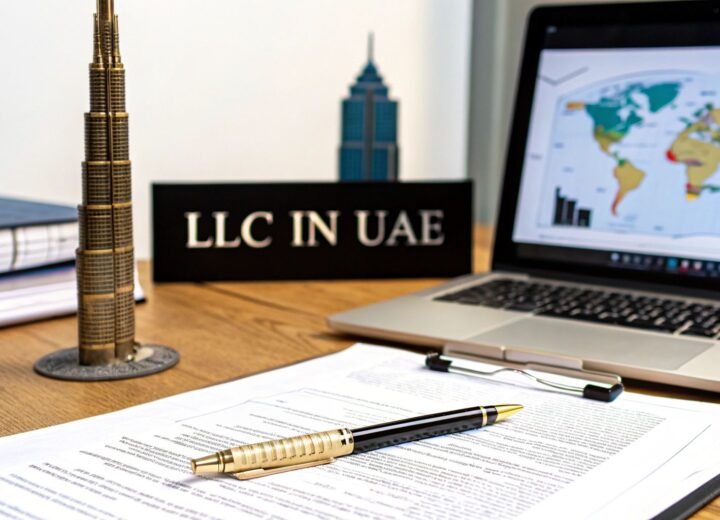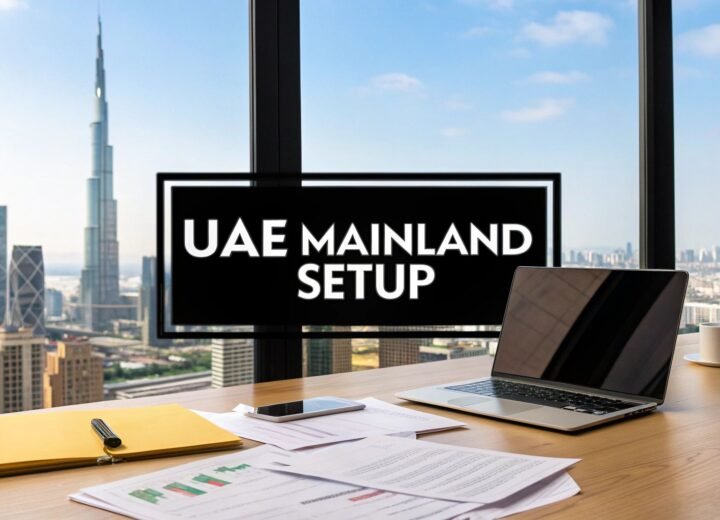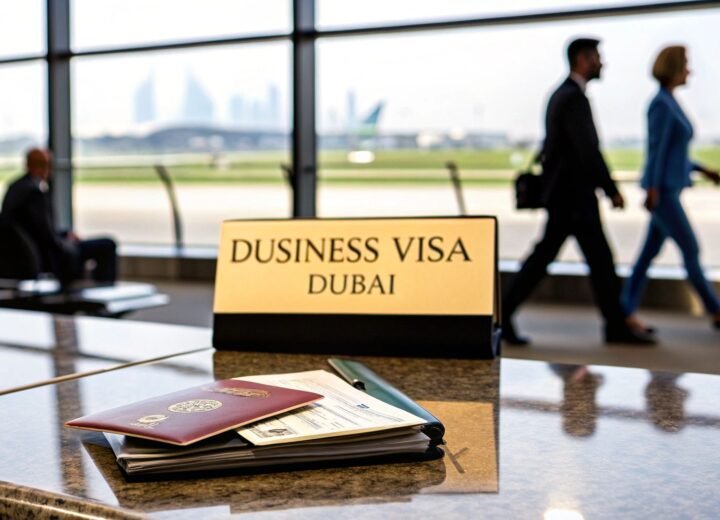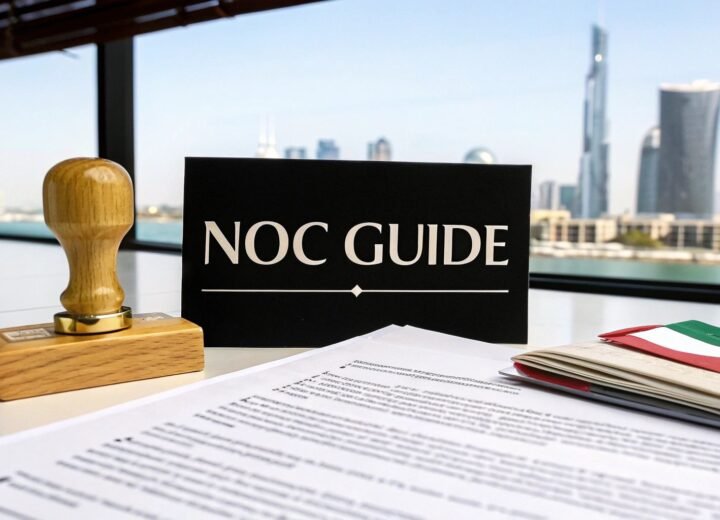Think of a Dubai trade licence as your company's passport. It's the official, non-negotiable document that gives you the legal right to do business here. Without it, your company simply doesn't exist in the eyes of the law. It’s the key that unlocks your ability to operate, trade, and grow in one of the world's most vibrant economic hubs.
Decoding Your Dubai Trade Licence Options
Getting a business off the ground in Dubai is an exciting prospect, but the very first fork in the road is choosing the right jurisdiction. This isn't just a bit of paperwork; it's a decision that will shape your company's entire future, from who you can sell to, to your ownership structure, and even your tax obligations.
The whole system is built around three distinct paths, each designed for different business models and ambitions.
Imagine you're opening a retail store. You could set up on a busy high street with lots of foot traffic (that's your Mainland option). Or, you could open inside a specialised shopping mall with other curated stores (a Free Zone). A third option would be to operate a warehouse that only handles international shipping and never sells to local customers (that's Offshore). Each location serves a unique purpose, and your Dubai trade licence is tied directly to the path you choose.
The Three Core Jurisdictions
Your journey starts by picking one of three foundational legal frameworks. Each comes with its own set of rules, benefits, and limitations, so it's crucial to understand the difference.
- Mainland Licence: This is your all-access pass to the entire UAE market. It lets you trade directly with any customer or company, anywhere in the country, and even bid on lucrative government contracts. If your goal is to be part of the local economy, this is the way to go.
- Free Zone Licence: These are special economic zones, often clustered by industry, that offer huge perks like 100% foreign ownership and tax exemptions. They're perfect for businesses focused on international trade or those wanting to be part of a specific industry ecosystem, like tech or media.
- Offshore Licence: This structure is for companies that don't plan to do substantial business within the UAE itself. It’s mostly used as a holding company for international assets or to manage global operations, offering major benefits in tax efficiency and confidentiality.
This simple diagram breaks down how these core licence types are structured.
As you can see, the trade licence is the foundational requirement, and from there, your choice of jurisdiction dictates everything else.
Dubai Licence at a Glance: Mainland vs Free Zone vs Offshore
To make things clearer, here’s a quick comparison of the three primary jurisdictions. This table highlights the key differences that matter most to entrepreneurs when they're just starting out.
| Feature | Mainland Licence | Free Zone Licence | Offshore Licence |
|---|---|---|---|
| Business Scope | Unrestricted trade within the UAE & globally | Trade within the Free Zone & internationally | Exclusively international business; no local UAE trade |
| Ownership | 100% foreign ownership for most activities | 100% foreign ownership guaranteed | 100% foreign ownership guaranteed |
| Office Space | Physical office space is mandatory | Flexible options (physical or flexi-desk) | Registered agent's office; no physical presence |
| Visas | Eligibility based on office size | Eligibility based on licence package | No eligibility for UAE residence visas |
| Taxes | Subject to 9% Corporate Tax on qualifying income | 0% Corporate Tax for qualifying income | 0% Corporate Tax |
| Best For | Local service providers, retailers, traders | Import/export, consultancies, global trade | Asset holding, international investments |
This side-by-side view really helps clarify which path might be the best fit for your specific business goals.
Why This Choice Matters More Than Ever
Picking the right licence isn't just a box to tick; it's the most critical strategic move you'll make. The UAE's business environment is absolutely booming, thanks to forward-thinking government reforms and a massive push towards digitalisation.
The numbers speak for themselves. The UAE has seen a huge surge in business registrations, with over 1.5 million active commercial licences reported nationwide by late 2024. In that year alone, around 200,000 new economic licences were issued, which shows just how much opportunity is out there.
By aligning your business model with the right jurisdiction from day one, you position your company for sustainable growth, compliance, and profitability in this thriving market. Whether you need direct market access in Dubai, a tax-efficient hub for global trade, or a secure structure for international assets, our specialists can guide you.
Making an informed choice between a Mainland, Free Zone, or Offshore setup is the first and most important step. You can dive deeper with a detailed comparison of each business license in UAE to see which path truly fits your vision. Our specialists can help international entrepreneurs make the right moves to take full advantage of UAE tax benefits and establish a powerful presence.
✅ Specialists in Mainland Company Formation in Dubai, Sharjah & Abu Dhabi
✅ Specialists in Freezone Company Formation across the UAE
✅ Specialists in Golden Visa on Property and Investor Visa
✅ Specialists in Corporate PRO Services and Attestation Services
✅ 24/7 Support Service – Always here when you need us
✅ Cost-Effective Business Setup Solutions tailored to your needs
✅ Enjoy UAE Tax Benefits for International Entrepreneurs
📞 Call Us Now: +971-54-4710034
💬 WhatsApp Us Today for a Free Consultation
Unlocking the UAE Market with a Mainland Licence
If a free zone licence is like having a storefront in a specialised business park, then a mainland Dubai trade licence is your all-access pass to the entire UAE economy. It's the ultimate key for anyone looking to trade, operate, and sell directly to customers and other businesses anywhere in the country, with zero geographical limits.
Think of it this way: a mainland company can open a shop in a bustling Dubai mall, set up a restaurant in a trendy Abu Dhabi neighbourhood, or launch a service centre right in the heart of Sharjah. This unrestricted market access is the single biggest advantage of a mainland setup, making it the go-to choice for businesses that want to be deeply integrated into the local market.
The Power of Unrestricted Operations
The government body that oversees mainland businesses in Dubai is the Department of Economy and Tourism (DET), formerly the DED. Getting your licence from the DET means you can legally do business with the entire domestic market—a critical factor for any company that relies on direct customer interaction.
This freedom isn't just about sales. With a mainland licence, you also get to:
- Choose Your Location Freely: You aren't confined to a specific zone. You can lease commercial space in any approved area that fits your business, whether that’s a high-street storefront, a corporate office tower, or an industrial warehouse.
- Bid on Government Contracts: Mainland companies are eligible to participate in lucrative government tenders and projects. This is a massive revenue stream that's completely off-limits to most free zone entities.
- Establish a Strong Physical Presence: For businesses like cafés, clinics, and consultancies, being visible and accessible is everything. The mainland framework is built to support exactly that.
For entrepreneurs planning to open retail stores, provide local services, or start a restaurant, a mainland Dubai trade licence isn’t just an option—it’s essential for scaling up and really capturing the market.
A New Era of 100 Percent Foreign Ownership
For years, the one thing everyone knew about mainland companies was the need for a local Emirati sponsor to hold a 51% majority share. However, recent, game-changing reforms have completely flipped this on its head, marking one of the biggest shifts in UAE business law we've ever seen.
Today, international entrepreneurs can have 100% foreign ownership for most commercial and professional activities on the mainland. This huge change has removed a major hurdle, giving foreign investors full control over their businesses without needing a local partner.
This legal update has brought the mainland’s ownership benefits much closer to what you’d find in a free zone, but with the massive advantage of unrestricted market access still intact. It’s a powerful combination that offers the best of both worlds for so many business types.
This reform has made setting up on the mainland more appealing than ever, empowering global entrepreneurs to build their ventures with total autonomy. While the new rules are incredibly beneficial, navigating the specifics can be tricky. For a detailed breakdown, check out our complete guide to mainland company formation in Dubai, which outlines exactly which activities are eligible for full ownership. Our specialists can provide tailored, cost-effective solutions to ensure your setup is fully compliant with the latest laws, helping you make the most of the UAE’s favourable tax benefits.
Using a Free Zone for Your Global Business
While a mainland licence plugs you directly into the UAE economy, a Dubai trade licence from a Free Zone is your strategic launchpad to the rest of the world. These specialised economic zones are powerful, self-contained business ecosystems built from the ground up for international entrepreneurs. They are magnets for global trade and investment for very good reasons.
Think of a Free Zone as its own dedicated business hub, almost like a city-within-a-city, complete with its own set of rules and a governing authority. Many are even tailored to specific industries—you’ll find tech giants in Dubai Internet City, media powerhouses in Dubai Media City, and commodities traders in the DMCC. This clustering effect creates a vibrant environment where businesses in the same field can connect and thrive.
The Key Advantages for International Entrepreneurs
The immense appeal of a Free Zone comes down to a powerful trio of benefits, especially for foreign investors. These advantages aren't just perks; they are legally guaranteed pillars of the Free Zone model.
- 100% Foreign Ownership: This is a big one. Unlike the historical mainland requirement for a local partner, Free Zones have always allowed complete foreign ownership. You maintain full control of your company, no strings attached.
- Full Repatriation of Profits: You are completely free to send 100% of your profits and capital back to your home country. There are no restrictions or currency controls, offering a level of financial freedom that is a major draw for international businesses.
- Tax Exemptions: Free Zone companies benefit from a very attractive tax environment, including exemptions from corporate and personal income taxes. This lets you reinvest more of your earnings directly back into growing your business.
These incentives make a Free Zone Dubai trade licence the perfect choice for businesses focused on import/export, international consulting, or e-commerce.
Operating in the Zone and Reaching the Mainland
When you operate from a Free Zone, your main business activities happen within its geographical borders or internationally. You can trade without restriction with other companies inside your zone or any other UAE Free Zone. More importantly, you can export your goods and services to anywhere in the world.
But what if you want a piece of the lucrative UAE mainland market? While you can't trade directly on the mainland, there's a straightforward and common solution. Free Zone companies simply appoint a locally licensed distributor or agent. This partner handles the sales and distribution of your products across the UAE, allowing you to reach local customers without needing a separate, and more complex, mainland licence.
This model is a cost-effective way to test the local market while enjoying all the benefits of your Free Zone status. As you plan your global reach, it's also worth looking into strategies for selling on Amazon internationally, as many of the same logistical and legal principles apply.
Dubai's Economic Powerhouse Status
The popularity of both mainland and Free Zone setups has firmly established Dubai as the commercial capital of the region. The numbers speak for themselves. By the end of the first quarter of 2025, Dubai had nearly 990,000 active business licences, accounting for roughly 59% of all active commercial licences in the entire UAE. This incredible figure shows just how central Dubai is to the nation's economy. You can dive deeper into these trends in the official 2025 investment climate statement.
For international entrepreneurs, a Free Zone offers a tailored, cost-effective, and tax-efficient environment to launch and scale a global business. It provides the ideal structure for those whose ambitions extend beyond the UAE's borders.
Our specialists in Free Zone company formation can walk you through the entire process, helping you choose the right jurisdiction that fits your industry and long-term goals. With our 24/7 support, we make sure your setup is smooth and efficient, so you can focus on what matters most—growing your international business.
Your Step-by-Step Licence Application Roadmap
Getting your Dubai trade licence isn't a complex maze—it's a structured journey. When you break it down into a clear sequence of steps, you can move efficiently from a business idea to a fully legal and operational company. Think of this as your roadmap, guiding you through each critical stage to help you avoid common pitfalls and delays.
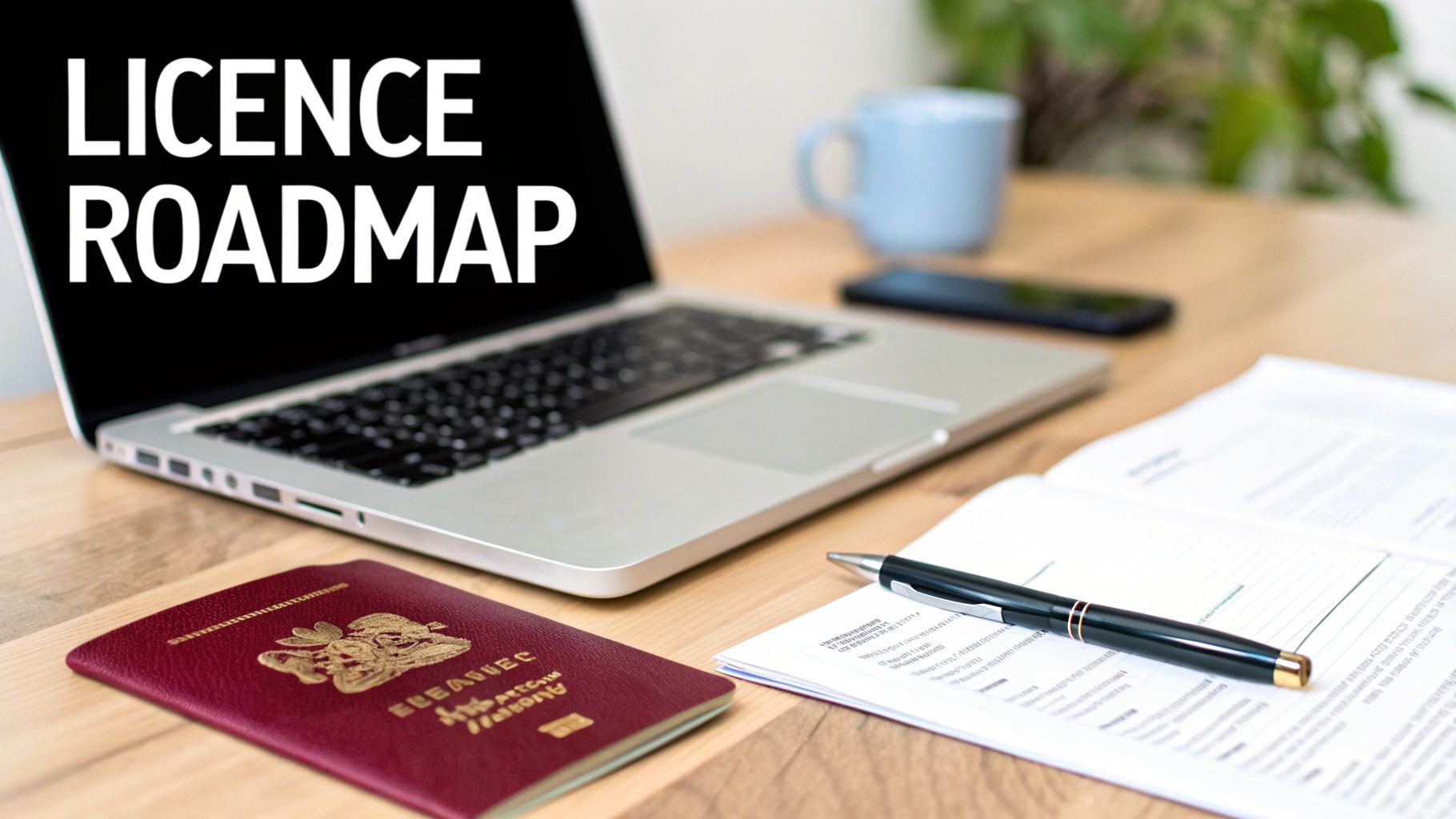
The entire process begins with defining the very foundation of your business and ends with you holding the official licence. Let’s walk through the plan.
Phase 1: Laying the Groundwork
Before you touch a single piece of paperwork, you need to make a few foundational decisions. These choices will dictate the rest of your application process, so getting this stage right is absolutely crucial for a smooth journey.
-
Define Your Business Activities: First things first, you have to clearly identify every single business activity you plan to conduct. The authorities maintain a comprehensive list of approved activities, and your licence will be strictly tied to the ones you select. This choice also steers you toward a commercial, professional, or industrial licence.
-
Determine Your Legal Structure: Next up is deciding on the legal form of your company. Are you setting up a Limited Liability Company (LLC), a Sole Establishment, or maybe a Civil Company? This decision has big implications for liability, ownership rules, and how you can structure your business down the line.
-
Reserve a Unique Trade Name: Your company’s name needs to be unique and follow UAE naming conventions. It can't already be in use, violate public morals, or contain religious references. You'll submit a few options for approval to the relevant authority, like the Department of Economy and Tourism (DET) for a mainland setup.
Once these initial steps are complete and your trade name is approved, you’re ready to move on to the next phase.
Phase 2: Securing Approvals and Preparing Documents
With your business structure and name locked in, the next phase is all about gathering official approvals and drafting your core legal documents. This is where your business really starts to take legal shape.
You'll need to apply for an Initial Approval, which is basically a preliminary thumbs-up from the authorities. This certificate confirms they have no objection to you establishing your business and allows you to proceed with the formal licensing process.
While you're waiting for this, you can get your key legal agreements ready:
- Memorandum of Association (MOA): If you have partners, this document is non-negotiable. It outlines the ownership structure, profit/loss distribution, and the responsibilities of each shareholder. It must be properly drafted and then notarised.
- Local Service Agent (LSA) Agreement: For professional licences on the mainland that are 100% foreign-owned, an LSA agreement with a UAE national is a must.
These documents are the legal backbone of your company, so making sure they're professionally drafted and attested is vital. Our team specialises in corporate PRO services, handling all MOA and Power of Attorney (POA) preparation and attestation to guarantee full compliance.
Phase 3: Finalising Your Setup
The home stretch! This final phase involves securing your physical space and submitting everything for your official Dubai trade licence.
Your business must have a registered physical address. This means signing a tenancy contract for an office, retail space, or warehouse and registering it with the Ejari system to get your official tenancy certificate.
Once all your documents are in place—the Initial Approval, notarised MOA, and your Ejari-registered tenancy contract—you can submit the final application to the licensing authority. After you pay the required fees, your trade licence will be issued.
This final step is the culmination of all your careful planning. The government is always working to make this process smoother. In fact, in 2025, Dubai implemented significant reforms to its trade licensing system as part of its ambitious D33 agenda, which aims to double the emirate's economy by 2033. These changes have further simplified the setup process for international entrepreneurs. You can learn more about Dubai's latest trade licence reforms and their impact on new businesses.
Navigating this journey is what we do best. With our 24/7 support and cost-effective solutions, we guide you every step of the way—from choosing your business activity to the moment you receive your licence.
Essential Documents for Your Dubai Trade Licence Application
Before you start, it’s a good idea to get your documents in order. Having a checklist helps prevent any last-minute scrambling and potential delays. While specific requirements can vary slightly based on your activity and jurisdiction, this table covers the standard paperwork you'll need.
| Document Type | Mainland Requirement | Free Zone Requirement |
|---|---|---|
| Passport Copies | For all shareholders and managers | For all shareholders and managers |
| Visa & Emirates ID Copies | For resident shareholders and managers | For resident shareholders and managers |
| Application Form | Completed form from the relevant economic department | Completed form from the specific free zone authority |
| Trade Name Approval | Certificate of trade name reservation from DET | Certificate of trade name reservation |
| Initial Approval | Certificate from the relevant economic department | Certificate from the free zone authority |
| Memorandum of Association | Notarised MOA for multi-shareholder companies | Often drafted and signed at the free zone |
| Tenancy Contract (Ejari) | Registered tenancy contract for the office/premise | Proof of office lease within the free zone |
| External Approvals | Required for certain regulated business activities | May be required depending on the activity |
Having these documents prepared will put you in a strong position to move through the application process efficiently. It's always best to double-check with your chosen authority for any additional requirements specific to your business.
Navigating Costs and Timelines for Your Setup
Before diving in, it’s vital to get a handle on the financial and time commitments needed for your Dubai trade licence. Think of it like planning any major project—knowing the costs and schedule upfront is the key to a smooth launch. There's no one-size-fits-all price tag, but understanding the main factors will help you budget properly and set realistic expectations.
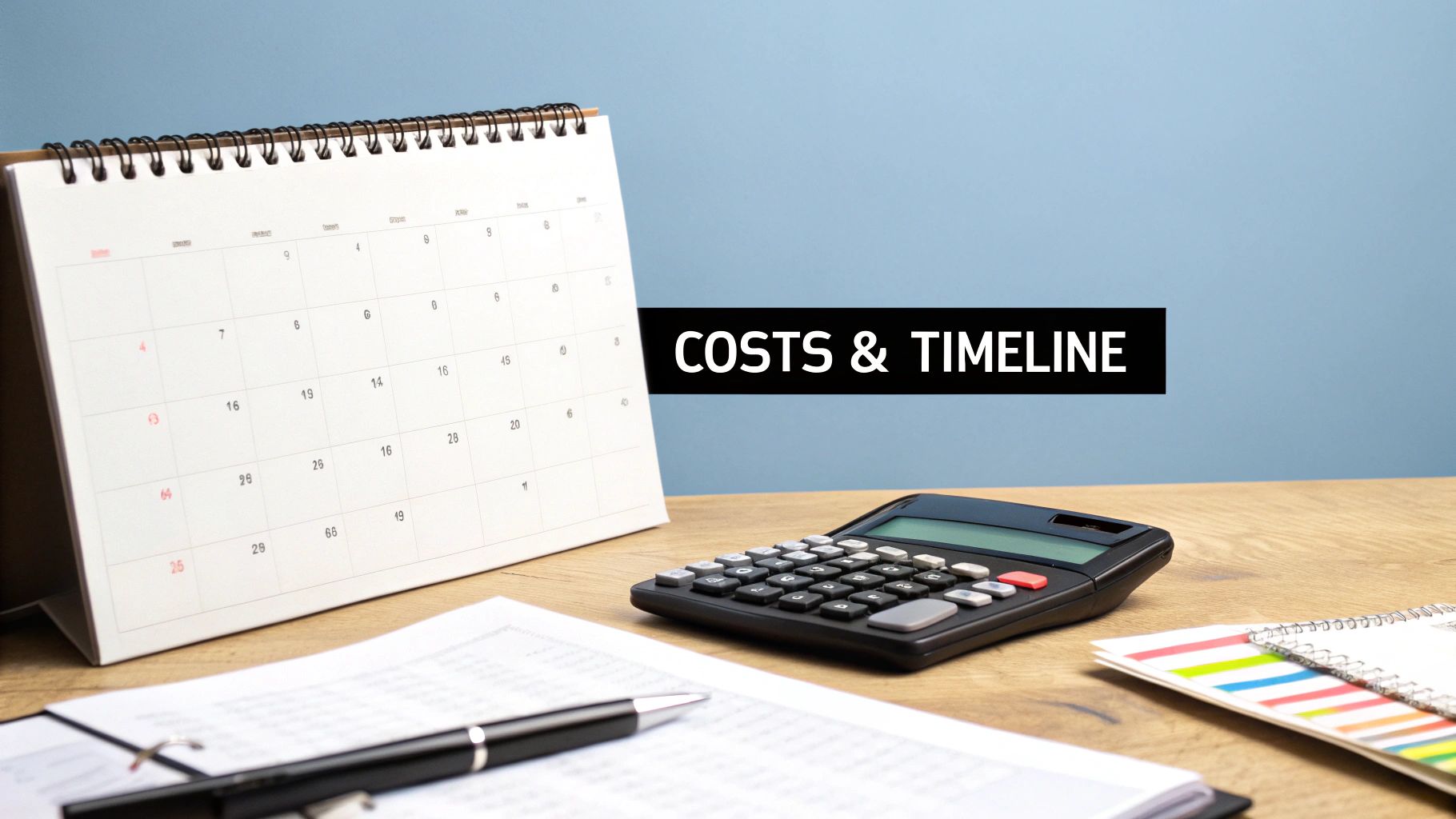
It’s a bit like building a house. The final bill depends on the location, size, and the quality of materials you pick. In the same way, your business setup costs will shift based on your jurisdiction (mainland or free zone), the type of activities you'll be doing, and how many visas you need.
Breaking Down the One-Time Setup Costs
Your initial investment covers all the essential government and administrative fees to get your company officially registered and ready for business. These are the costs you’ll pay once at the very beginning.
Here’s a quick look at the main one-time expenses:
- Trade Name Reservation: The fee paid to the authorities to lock in your company name.
- Initial Approval Certificate: This covers the issuance of a preliminary no-objection certificate, giving you the green light to move forward with your application.
- Licence Registration and Issuance: This is the primary government fee for registering your business and getting the final trade licence in your hands.
- Memorandum of Association (MOA) Attestation: You'll have costs for drafting, notarising, and legally attesting your company's foundational document.
- Office Lease Registration (Ejari): For mainland companies, there's a fee to register your tenancy contract with the official Ejari system.
These fees can add up to anything from a few thousand to several thousand dirhams, with the biggest variable being your choice of a mainland or free zone setup. For a more granular breakdown, check out our guide on the specific trading license cost in Dubai, which details expenses for different jurisdictions.
Understanding Recurring Annual Expenses
Beyond the initial setup, you need to plan for recurring annual costs to keep your business legally active. The big one, of course, is the renewal of your Dubai trade licence.
Other ongoing costs to factor into your budget include:
- Licence Renewal Fees: Paid every year to the relevant authority to keep your licence valid.
- Office Rent: This is a major ongoing expense, whether you have a physical office on the mainland or a flexi-desk package in a free zone.
- Establishment Card Renewal: This card is crucial for processing visas and needs to be renewed annually.
- Visa Renewals: Residence visas for yourself, your partners, and your employees typically need renewing every one to two years.
Planning for these recurring costs is just as important as budgeting for the initial setup. Factoring them into your financial projections ensures your business remains compliant and sustainable in the long run.
Realistic Timelines for Licence Issuance
So, how long does it all take? You might be surprised. When handled correctly, the process is quite efficient.
On average, a mainland company can be fully set up within one to two weeks, assuming all your documents are in order and submitted correctly.
Free zones are often even quicker, with some authorities issuing licences in just a handful of days. Of course, things like needing external approvals for specialised activities or delays in getting documents attested can add to these timelines.
This is where working with a specialist really helps. Our team manages the entire process for you—from preparing the paperwork to liaising with government departments—to ensure everything moves along smoothly and quickly. The goal is to get you up and running without any unnecessary hold-ups.
Life After Your Licence Is Issued
Getting your Dubai trade licence is a huge milestone, the official green light for your business journey. But while it's definitely a moment to celebrate, think of it less as the finish line and more as the starting pistol firing. With that licence in hand, the real work begins—making your business fully operational, from hiring your first employee to managing your finances correctly.
This next phase is all about turning your company from a legal entity on paper into a living, breathing operation. You're shifting gears from paperwork and approvals to the practical, day-to-day functions of running a business. These post-licence steps are non-negotiable and lay the foundation for your long-term success in the UAE.
Getting Your Business Operations Up and Running
The very first thing you need to do is apply for your company's Establishment Card. Think of this card as your company's official ID for all immigration and labour matters. You can't hire anyone or sponsor residence visas without it, which makes it an absolute top priority.
Once you have the Establishment Card, you can start the visa process:
- Investor Visa: As a business owner or partner, you’ll need to secure your own residence visa under the company. Our specialists can sort this out for you, whether it's an Investor Visa or even a Golden Visa on Property, depending on what you're eligible for.
- Employee Visas: For every person you bring onto your team, you'll need to apply for their employment visa and labour card. This entire process is managed through your company's Establishment Card.
Our PRO services team is here to take the headache out of all visa applications, making sure your team is legally registered and ready to hit the ground running.
Building Your Financial Foundations
With your company legally formed and visas in motion, opening a corporate bank account is the next critical task. Honestly, running a business in the UAE without a local corporate bank account is next to impossible. It's essential for managing transactions, getting paid, and keeping a clear line between your personal and business finances.
A corporate bank account isn't just a logistical necessity; it adds a layer of professionalism and is a core requirement for financial transparency and compliance with UAE regulations. It's a cornerstone of good business practice here.
Opening an account can be quite detailed, with banks asking for specific documents about your company, its shareholders, and your business plan. Our experts can give you a hand with this, helping you get all the paperwork in order and liaising with the banks to make sure the account opening is as smooth as possible.
Staying Compliant for the Long Haul
Your duties as a business owner don't stop once you're up and running. Keeping your Dubai trade licence valid and staying on the right side of UAE laws are ongoing commitments that are vital for sustainable growth. The biggest one is the annual renewal of your trade licence.
Missing your renewal deadline can lead to hefty fines, your company's bank account being frozen, and losing the ability to sponsor or renew employee visas. It's just not worth the risk. Beyond that, you'll need to keep up with any changes in commercial laws, tax rules, or reporting requirements.
We offer business setup solutions that go way beyond just the initial registration. With our 24/7 support, we help international entrepreneurs manage these ongoing tasks, ensuring you can enjoy the full tax benefits of the UAE while staying fully compliant. For a free chat about what's next for your business, just WhatsApp us today.
Common Questions About Setting Up Your Dubai Business
Starting a business in Dubai is an exciting prospect, but it's natural to have questions. We’ve guided countless entrepreneurs through this journey, and we've noticed a few queries that pop up time and time again. Here are the clear, straightforward answers you're looking for.
Can I Get a Dubai Trade Licence Without a Physical Office?
Yes, in many cases, you absolutely can, particularly if you're setting up in a Free Zone. Most free zones are designed with modern entrepreneurs in mind, offering flexible options like flexi-desks or virtual office packages. These are a perfect fit for consultants, solopreneurs, and international businesses that don't need a dedicated physical footprint just yet.
When it comes to a mainland licence, however, the rules are a bit more traditional. A physical office address, registered through the Ejari system, is typically a must-have. While there are some exceptions for specific professional services, having a tangible office is the general expectation.
How Long Is a Dubai Trade Licence Valid For?
Your standard Dubai trade licence is good for one year. Think of it like an annual subscription for your business—to stay active and legally compliant, you have to renew it every year.
The renewal process itself is quite simple, but it's something you can't afford to miss. It involves submitting your latest documents, paying the renewal fees, and making sure your office lease is still valid. Dropping the ball on renewal can lead to hefty fines, having your business activities suspended, or even getting your corporate bank account frozen.
Can I Have Multiple Business Activities Under One Licence?
You certainly can. It’s quite common to group several related business activities under a single trade licence. Both the Department of Economy and Tourism (DET) on the mainland and the authorities in the various free zones have pre-approved lists of activity groups. As long as your chosen activities fall under the same umbrella—like commercial or professional—they can usually be combined.
Just keep in mind that adding more activities can sometimes increase the cost of your licence. This is where getting expert advice from the get-go pays off. A setup specialist can help you structure your licence in the most logical and cost-effective way.
What's the Difference Between a Professional and a Commercial Licence?
The main difference boils down to what your business actually does.
A Commercial Licence is for any business focused on trading—that is, buying and selling goods. This covers everything from retail shops and general trading companies to e-commerce platforms. If your business involves physical products, this is likely the licence for you.
On the other hand, a Professional Licence is for businesses that provide services based on expertise or skill. This includes consultants, designers, doctors, marketers, and artisans. One of the big advantages here, especially on the mainland, is the ownership structure. Professional licences can often be set up as a Sole Establishment, which opens the door to 100% foreign ownership by appointing a Local Service Agent instead of a local sponsor.
Figuring out the nuances of mainland vs. free zone, visas, and legal structures is what we live and breathe. At PRO Deskk, we handle everything from start to finish—licence issuance, corporate PRO services, and even Golden Visa applications—so you can focus on your business. Our specialists are on call 24/7 to help you get started.
📞 Call Us Now: +971-54-4710034
💬 WhatsApp Us Today for a Free Consultation: https://prodesk.ae

